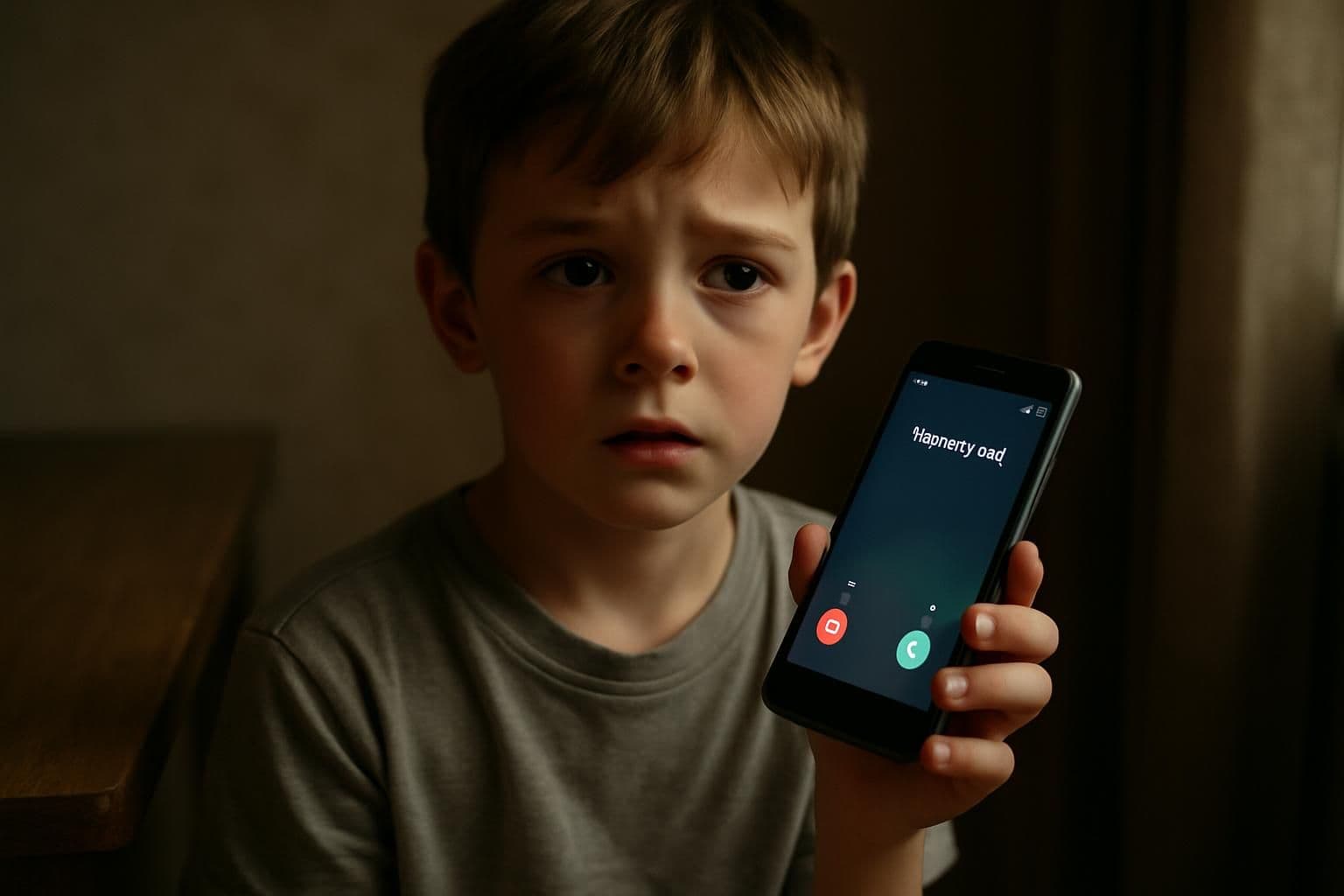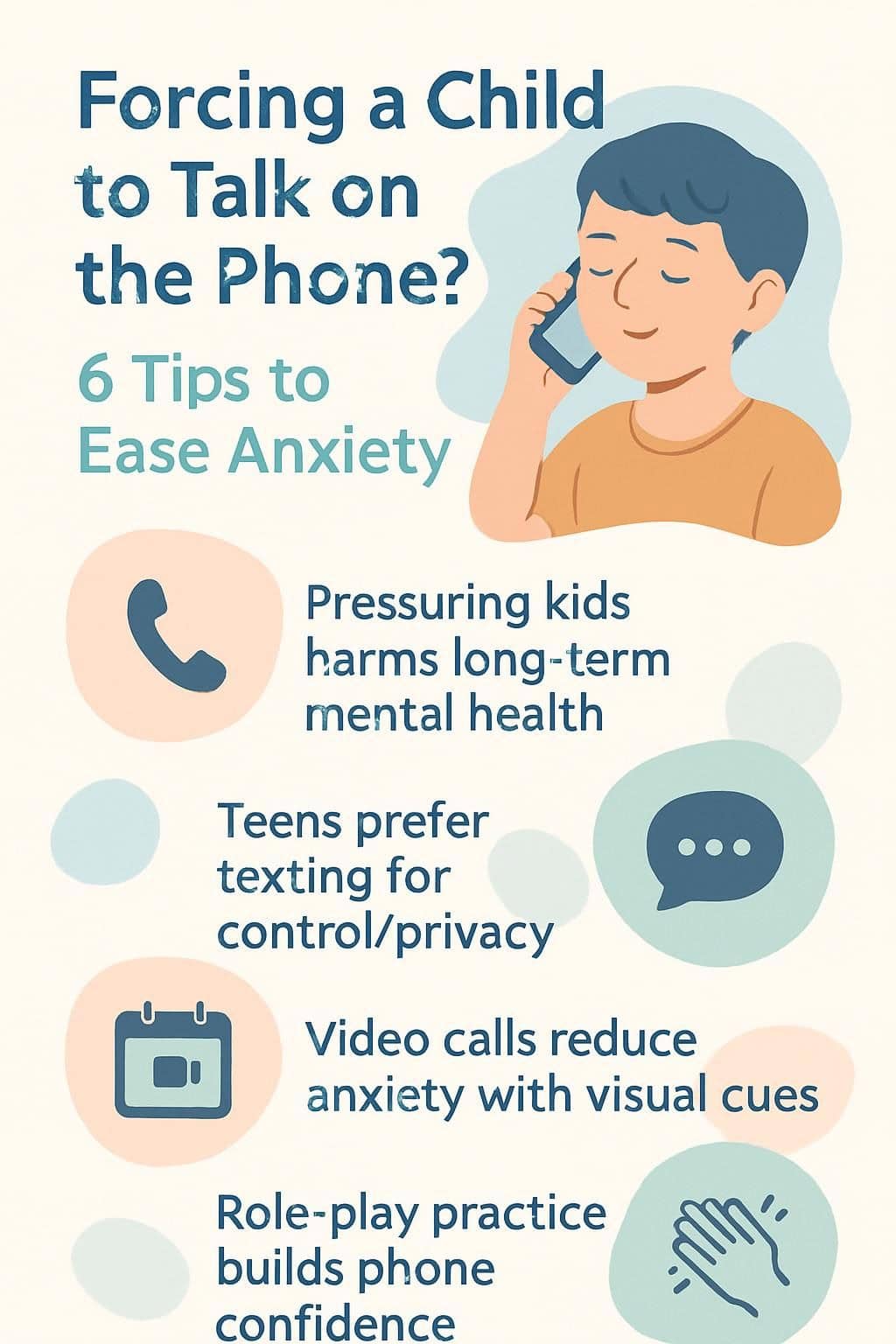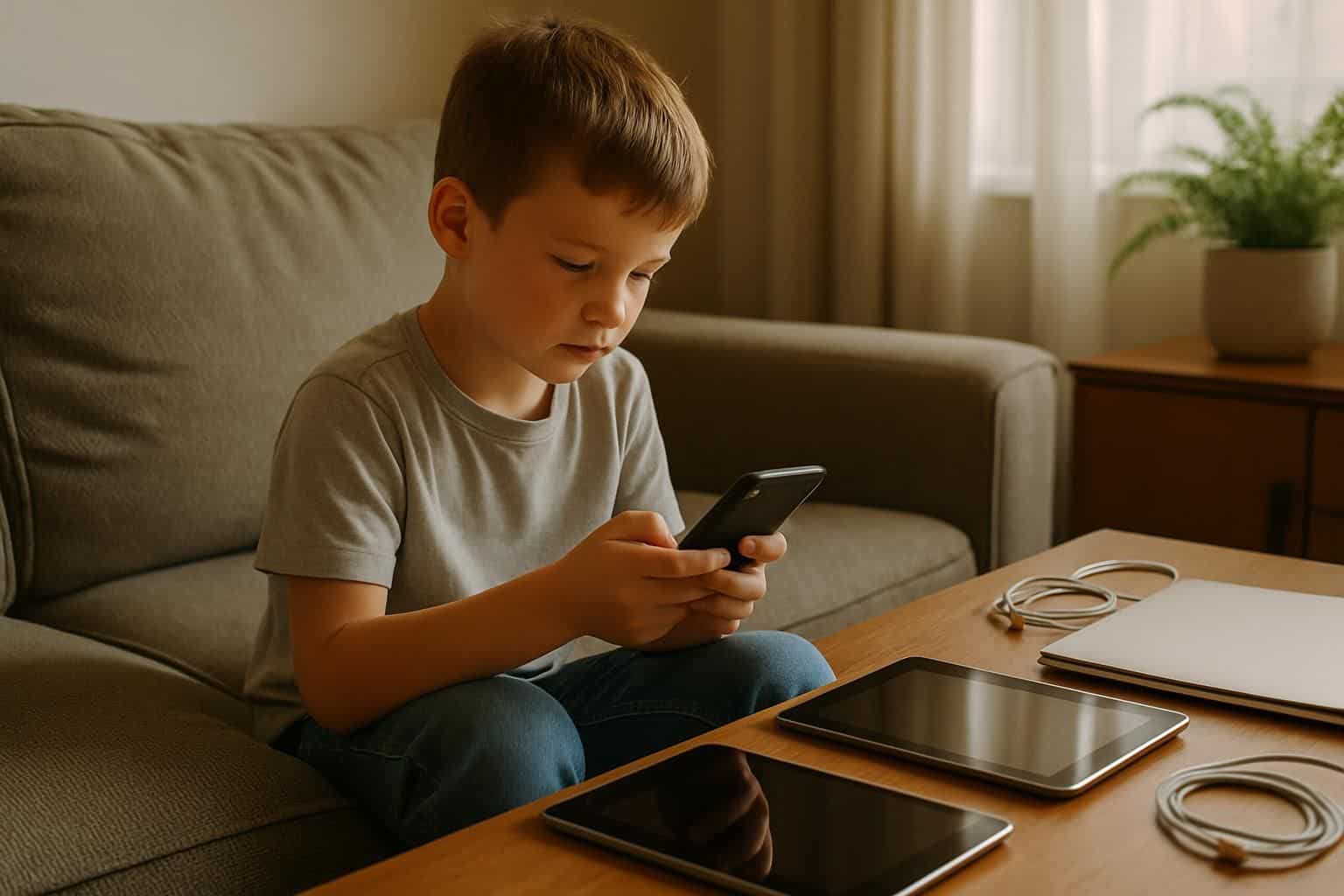Are phone calls with your kid becoming a real challenge, causing stress for you both? Forcing a child to talk on the phone can increase anxiety and cause tension in your parent-child relationship.
In this post, you’ll find clear tips to ease phone anxiety, respect boundaries, and encourage better communication without stressing out your child. Keep reading to help make those tough parenting moments easier.
Key Takeaways
Pressuring kids into phone calls can negatively affect their mental health, creating stress that may turn into anxiety lasting through their teen years.
Teens typically choose texting instead of talking on the phone, as texting allows more control and privacy during conversations.
Anxious kids usually feel calmer on video calls compared to regular calls—seeing faces lets them notice visual hints, like smiles and expressions.
Practicing phone conversations through role-play gives children a chance to build their confidence naturally, without feeling pressured or overwhelmed.
By 2025, more households will wait until kids turn 14 before giving them smartphones, encouraging stronger face-to-face social skills early on.
Table of Contents
Why Forcing a Child to Talk on the Phone Can Be Harmful

Forcing kids to talk on the phone can harm their mental health more than parents realize. Phone anxiety is real, and pushing a child to chat when they’re not ready can create lasting stress and fear.
Impacts on mental health
Pushing kids into phone conversations can genuinely harm their mental health. Research indicates that pressuring children into uncomfortable talks over the phone raises their stress.
Over time, this added tension can turn into anxiety, even lasting into their teenage years. Girls, in particular, appear more vulnerable—facing higher rates of emotional distress after negative experiences communicating by phone.
Parents sometimes unknowingly increase the problem by repeatedly calling their children. Kids under phone pressure may feel stuck, torn between pleasing grown-ups and holding onto their comfort levels.

Phone anxiety goes beyond simple shyness—it often connects deeply with self-doubt, insecurity, and fear of judgment. Children who feel forced to mature from unwanted phone calls may pick up unhealthy coping methods.
Over time, these habits can hurt the child’s social growth and well-being. Stress from phone-related anxiety can even interfere with sleep routines. Poor sleep then harms brain performance, emotional balance, and overall mood.
Kids deserve clear boundaries with all types of communication. Honoring their limits provides them with security, helps build family trust, and safeguards a healthy sense of self. Protecting these emotional boundaries becomes essential for their future mental health.
Increases anxiety and discomfort
Making a child talk on the phone can worsen their anxiety. Many kids genuinely fear speaking to someone they can’t see. This fear often shows itself through sweaty palms, a racing heart, or even tears.
My nephew once hid under his bed because his mom insisted he chat with grandma. Phone calls place children in a tough situation—they lose visual signals that tell them it’s their time to speak, or how the other person might be feeling.
For kids with social anxiety disorder, phone calls feel like tests they’ll never pass.
A child’s anxiety is not something to dismiss – it’s a real feeling that deserves our respect and care.
Mental health specialists suggest continuous pressure to make calls harms a child’s trust toward parents. Adults might think these expectations are minor ones, yet for children, they feel harsh—even emotionally damaging.
Child custody experts report that forced communication can harm parent-child relationships. Rather than bringing families closer, this stress drives kids away. Many parenting plans now have clear guidelines about phone communication, designed to protect children from unnecessary pressures.
More insights about forcing communication can be found in this helpful post: forcing a kid to jump.
Communication Preferences of Children

Kids today have grown up in a digital world where texting feels more natural than talking. Many children find phone calls stressful and prefer the time to think that text messages allow.
Preference for texting over phone calls
Today, teens mostly grab their phones to text instead of making a call. Research reveals most adolescents prefer texting since it gives them more privacy and control in conversations.
My daughter, for instance, almost never answers my calls—but she responds to texts in seconds. This shift isn’t just about dodging awkward silences; texting has become a key way teens build their independence and keep friendships alive.
Most teens regularly text friends or romantic interests far more than they message their parents. This habit usually peaks around 11th grade, as teenagers try shaping their own identities.
While plenty of parents worry this texting pattern means their child lacks social skills, that’s actually not the case. For many teens, texting just feels safer and more comfortable overall.
Even courts have noticed teenage preferences for texting during parental rights cases—acknowledging that forcing teens into phone calls can cause anxiety and stress.
Importance of respecting a child’s communication style
Lots of kids today like texting better than talking on the phone, and that’s totally okay. Each child has a personal way of opening up and sharing their thoughts. Some children find texting easier, while others prefer chatting face-to-face.
Parents who honor these different communication styles usually end up closer to their kids.
Listening to how your child wants to communicate shows them their voice matters.
Pressuring a kid into phone conversations can break down trust between parent and child. Good communication with adults helps children grow emotionally, according to child experts at BabyCenter.
Kids often use words along with body movements or facial expressions to share how they feel. They feel important when adults truly pay attention. In Missouri, family lawyers often point out that respecting how your child wants to communicate can help avoid accusations of parental alienation.
Respecting this freedom builds an environment where kids feel safe to open up, without worrying about being judged.
Social and Emotional Implications

When kids feel forced to talk on the phone, they often shut down instead of opening up. This pressure can damage the parent-child bond and make children less likely to share important feelings in the future.
Pressure to conform to adult expectations
Kids often feel anxious about phone calls because adults expect them to obey social rules. Parents might push their child to speak with grandma or take calls from dad after a divorce.
But forcing phone conversations can harm a child who already struggles with phone anxiety. Many family lawyers in southern states point out that pressured communication often sparks conflict in custody cases.
This stress can affect brain growth and may lead to emotional issues that last into adulthood.
Children deserve space and time to build their own comfort with phone conversations. Pressuring them into calls sends a message that their feelings aren’t important—this can hurt self-esteem.
Family courts sometimes hear mental abuse claims due to intense parental pressure for phone contact. A father’s rights matter, but courts must balance these rights carefully with the emotional needs of children.
Discussions on Avvo legal forums highlight just how frequently these disputes arise, and judges now increasingly consider what kids themselves prefer.
Potential decline in trust and openness
Pressuring children into unwanted phone conversations can damage trust between parent and child. I’ve seen this often with clients—kids pull back and stop sharing their feelings after uncomfortable calls.
Children deserve to feel that their boundaries are respected. A parent who honors a child’s anxiety around phone calls establishes a strong foundation of trust. Showing respect sends the message that their emotions matter, helping them open up about other situations later.
Family relationships often take a hit if grown-ups insist on phone calls that a child resists. Legal experts point out that children feeling pressured may begin hiding their genuine thoughts and emotions.
Some kids will simply say what adults expect, just to wrap up the call sooner. This behavior can create distance, blocking honest communication between parents and their children. Instead of forcing phone conversations, parents can consult attorneys to build family communication plans that honor everyone’s comfort.
Alternatives to Forcing Phone Conversations

Kids need options beyond phone calls to feel safe and heard. Parents can try text messages, social media apps, or even old-fashioned letter writing to keep family bonds strong without the pressure.
Encouraging open communication through other channels
Phone calls can feel stressful for lots of children—but parents have plenty of easier, more relaxed ways to help them stay connected comfortably:
- Text messaging is a great first step for easing anxious feelings about voice calls. Many children feel calmer writing their thoughts rather than speaking them out loud, as it allows extra time to choose their words.
- Video apps, like Zoom or FaceTime, provide visual communication that often feels friendlier and easier than regular phone calls. The benefit of seeing smiles, laughter, and facial reactions helps kids follow conversations smoothly, making interactions feel less tense.
- Voice notes offer an easygoing alternative, giving children a chance to record short messages without the pressure of instant replies. It’s an ideal middle ground between sending texts and holding live phone conversations.
- Family chat groups create warm, relaxed spaces where children join conversations comfortably on their own terms. Dr. Kimberly Burkhart approves this method because it supports children’s boundaries and helps them stay connected.
- Emails can be a helpful option for longer conversations with relatives who don’t live nearby. Children can comfortably share stories, updates, or photos without the pressure to respond quickly.
- Creative apps allow kids to communicate naturally through art, music, or pictures—instead of having direct, spoken conversations. These playful communication tools promote confidence and creativity, while also encouraging important social skills in a fun and relaxed way.
- Online gaming with voice-chat options lets children talk naturally while focusing on gameplay, making conversations flow more easily. Chatting while playing games takes away awkward silences and helps children feel relaxed around others.
- Shared digital journals help family members stay connected, exchanging notes and photos without rushed or stressful interactions. This approach lets everyone express thoughts at a relaxed pace, creating a comfortable way to keep in touch.
Using video calls as a middle ground
Video calls can be great for kids who aren’t big fans of phone conversations. Seeing faces helps them pick up visual cues—like smiles, nodding, or friendly gestures. That cuts anxiety and boosts their comfort level, all while building important talking skills.
Since COVID-19 began, digital interactions have skyrocketed, with phone-based mental health sessions hitting 63%. My own daughter used to duck behind me, nervous and shy, the moment relatives called.
But video chats made a huge difference—she relaxed once she could read faces clearly. Research even supports this, showing video-based sessions do a better job improving mood than voice-only calls.
Being able to see who’s on the other end creates a safer, more comfortable experience. Kids feel less pressure than hearing a voice alone. For starters, keep video calls short and playful, focusing on easy-going activities or show-and-tell moments instead of a back-and-forth chat.
Now, we’ll cover some easy tips you can use to respect your kid’s comfort level while still helping them build good communication habits.
Tips for Parents

Parents need clear steps to help kids feel better about phone calls. These tips will make phone time less scary for your child while building their social skills at their own pace.
Understanding your child’s boundaries
Kids need boundaries just as much as they need affection. These invisible guidelines help children feel secure and better understand how to behave around others. You might notice clear signals if your child feels uneasy during phone chats with relatives.
They may avoid eye contact, squirm in their seat, or simply reply with one-word answers. Stay alert to these subtle clues—respecting them builds stronger trust between you and your child.
Boundaries aren’t walls that separate us from our children—they’re bridges that connect us through respect.
I’ve seen this myself with my shy daughter. Pushing her into phone conversations with family only increased her anxiety. Once I allowed her to join at her own comfort level, she gradually relaxed and started speaking up willingly.
Setting clear limits helps kids grow and boosts their emotional control. This doesn’t mean going easy all the time—it’s about providing a comfortable environment where kids can safely practice expressing themselves.
Teaching phone etiquette without force
Phone skills really matter—but forcing kids into phone calls only creates anxiety. For my shy seven-year-old, role-playing has been a real lifesaver. Together we pretend to order pizza or chat with grandma, practicing simple greetings and responses in a relaxed way.
This playful method eases the pressure, helping her gain confidence naturally.
Children also learn from watching adults handle phone conversations calmly. My daughter often uses phrases she’s picked up from overhearing my calls. Start small with easy skills—like clearly saying “hello” and “goodbye”—then slowly move into longer chats as comfort grows.
Many parents rush their kids into phone skills, but patience truly helps. The aim isn’t perfect manners overnight, just gradual comfort with speaking on the phone. Celebrate small victories along the way—even a quick “hi” to grandpa counts as success! Now, let’s consider how communication methods for kids may shift over the next few years….
How Will Our Approach to Children’s Communication Evolve in 2025?
By 2025, parents will likely set clearer rules about digital devices at home. More and more families will choose to delay smartphone use until children turn 14, following advice from groups like Smartphone Free Childhood.
The goal is simple—to help kids build solid face-to-face communication skills before stepping into digital spaces. Proposals for keeping social media off-limits until age 16 could gain stronger backing as research reveals deeper impacts of screen time on young minds.
Digital wellness will become a major priority in homes and classrooms across America. Many parents might create device-free areas and special no-phone hours, making room for genuine, direct conversations.
New apps and tools designed to limit daily screen time will assist families in striking a balance between online interactions and real-world talks. As anxiety levels among kids continue to rise, these measures won’t feel optional—they’ll become necessary steps to safeguard children’s mental health, while teaching healthy conversation skills early.
People Also Ask
Why do some kids get anxious about talking on the phone?
Many kids feel uneasy speaking on the phone because they can’t see the other person’s face. They might not know what to say next or how to end the conversation. Younger children may find phones strange or intimidating—especially if they don’t use them very often.
Is it okay to make my child talk to relatives on the phone?
It’s okay to gently encourage your child, but forcing them may increase anxiety. Go easy and respect their comfort zone, helping them slowly build confidence through regular practice. Phone conversations get easier over time, as children gain more experience.
What are some ways to help a child who hates phone calls?
Begin with short calls to people your child knows well. Practicing before the call may ease their worry. You could try a speaker phone so your child feels less alone—or video calls first, since seeing familiar faces makes conversations easier.
At what age should children be comfortable with phone conversations?
There’s no exact age when kids become comfortable talking on the phone. Some 5-year-olds happily talk for hours, while teens might still struggle with phone anxiety. Be patient and supportive, allowing your child to steadily develop this skill at their own pace.
References
https://pmc.ncbi.nlm.nih.gov/articles/PMC7012622/
https://www.helpguide.org/mental-health/anxiety/anxiety-in-children-and-teens
https://childmind.org/article/what-to-do-and-not-do-when-children-are-anxious/
https://pmc.ncbi.nlm.nih.gov/articles/PMC8669751/
https://www.unicef.org/parenting/child-care/9-tips-for-better-communication
https://extension.missouri.edu/publications/gh6123
https://pmc.ncbi.nlm.nih.gov/articles/PMC8120989/
https://raisingchildren.net.au/toddlers/health-daily-care/mental-health/social-anxiety
https://childmind.org/article/social-media-and-self-doubt/
https://www.uhhospitals.org/blog/articles/2022/07/how-parents-can-help-reduce-childrens-stress-anxiety-and-depression (2023-05-24)
https://www.childrenssociety.org.uk/what-we-do/blogs/overcoming-phone-anxiety
https://nurturedfirst.com/toddler/setting-boundaries-guide/ (2024-10-28)
https://yourteenmag.com/family-life/communication/teaching-telephone-skills
https://www.weforum.org/stories/2025/01/jonathan-haidt-digital-technology-social-media-childhood/
https://www.nytimes.com/2025/04/01/opinion/ezra-klein-podcast-jonathan-haidt.html
